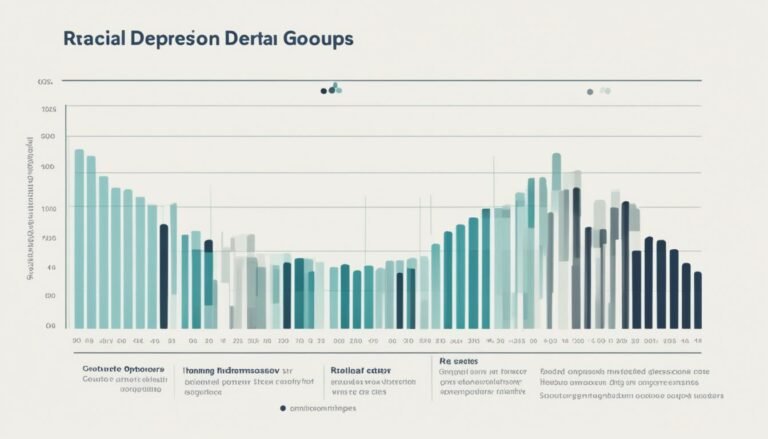Who has the worst depression in the world?
Depression is a severe mental health condition that affects millions of people globally. With its debilitating symptoms and substantial impact on individuals and society, it has become a global mental health crisis. Understanding the prevalence of depression worldwide can shed light on the magnitude of this issue and the urgent need for effective interventions.
Key Takeaways:
- Depression is a global mental health crisis with severe consequences.
- Understanding the prevalence of depression worldwide is crucial.
- Efficient interventions are necessary to address the scale of the problem.
- Depression can impact individuals and societies in various ways.
- Access to mental health care plays a significant role in managing depression.
Global Depression Rates
Depression is a widespread mental health epidemic, with global implications. According to the World Health Organization, approximately 280 million people worldwide are affected by depression, making it the leading cause of global disability. The prevalence of depressive disorders varies across countries, reflecting the complex nature of this mental illness.
In the United States, depression rates are significant, with an estimated 5% of the population affected. This places the United States at the 29th position among countries with the highest depression prevalence. It is staggering to consider that around 15 million Americans are living with some form of depression.
However, comparing depression rates between countries can be challenging. Cultural stigmas surrounding mental health and disparities in the availability of mental health care can impact the accuracy of reported rates. Nonetheless, it is evident that depression is a global concern that requires attention and action.
Global Depression Rates Comparison
Below is a comparison of depression prevalence rates in select countries:
| Country | Depression Prevalence |
|---|---|
| Ukraine | 6.3% |
| Greece | 6.1% |
| Spain | 5.5% |
| Portugal | 5.3% |
| Palestine | 5.0% |
These statistics highlight the significant burden of depression in these countries, and the urgent need for effective strategies and support systems to address mental health concerns.
Most Depressed Countries in the World
In the Global Burden of Disease study, several countries stand out for having high rates of depression. These statistics shed light on the global burden of depression, highlighting the challenges faced by individuals and communities worldwide. The most depressed countries, based on the study, include Ukraine, Greece, Spain, Portugal, and Palestine.
These countries have depression rates ranging from 6.3% to 5.75%. The prevalence of depression in these regions signifies the significant impact it has on the mental well-being of their populations.
The economic challenges faced by Greece, Spain, and Portugal, as well as political unrest in Palestine, may contribute to the higher levels of depression observed in these regions. Socioeconomic conditions play a crucial role in mental health, and the absence of stable and supportive environments can exacerbate depressive symptoms.
It is important to note that depression rates are influenced by various factors, not limited to economics and politics. Access to mental health care, cultural attitudes towards mental health, and individual experiences also shape these statistics. Understanding these factors is vital in addressing the global burden of depression and implementing effective interventions to improve mental health care worldwide.

Factors contributing to depression
Several factors play a role in the development of depression, including biochemistry, genetics, personality, and environment. Understanding these risk factors can help identify individuals who may be more susceptible to experiencing depression.
One significant risk factor for depression is genetics. Research has shown that individuals with a family history of depression have a higher likelihood of developing the condition themselves. It is believed that certain genes may contribute to the brain chemistry imbalances associated with depression.
Personal characteristics can also increase the risk of depression. Individuals with a pessimistic outlook, low self-esteem, or a tendency to overthink may be more prone to experiencing depressive symptoms. These personality traits can affect one’s ability to cope with stress and contribute to the development of depression.
Furthermore, environmental factors can play a crucial role in depression risk. Exposure to violence, abuse, neglect, or poverty can significantly impact an individual’s mental and emotional well-being, increasing the likelihood of developing depression. Living in a stressful or unsupportive environment can also contribute to the development of depressive symptoms.
It is important to note that while these risk factors can increase the likelihood of developing depression, they do not guarantee that an individual will experience the condition. Depression is a complex mental illness influenced by various factors, and its development can differ from person to person.
Fortunately, depression is a treatable condition with multiple options for treatment. The most common treatment approach is a combination of antidepressant medication and psychotherapy. Antidepressants can help regulate brain chemistry and alleviate symptoms, while psychotherapy, such as cognitive-behavioral therapy (CBT), can provide individuals with coping strategies and help reshape negative thought patterns.
In severe cases where other treatment options have not been effective, electroconvulsive therapy (ECT) may be considered. ECT involves inducing controlled seizures, under anesthesia, to stimulate the brain and relieve depressive symptoms. It is typically used as a last resort when all other treatment options have been exhausted or in cases where immediate symptom relief is necessary.
By understanding the risk factors associated with depression and the various treatment options available, individuals and healthcare professionals can work together to provide effective support and care for those struggling with this mental illness.
Conclusion
Depression is a global mental health crisis that affects millions of people worldwide. The prevalence of depression varies between countries, with Ukraine having the highest rate of depression. According to global mental illness statistics, 6.3% of the population in Ukraine suffers from this debilitating condition. However, it is important to note that depression rates can be influenced by various factors, such as socioeconomic conditions, access to mental health care, and cultural attitudes towards mental health.
Factors such as economic challenges, political unrest, and limited mental health resources contribute to higher levels of depression in certain regions. For instance, Greece, Spain, Portugal, and Palestine also have significantly high depression rates ranging from 6.3% to 5.75%. To address this mental health crisis, it is crucial to raise awareness about depression and improve access to treatment for individuals experiencing this mental illness.
Raising awareness about depression and reducing the associated stigma can help encourage individuals to seek help. In addition, providing adequate mental health care resources, including counseling services, therapy, and medication options, is crucial to effectively address the global mental health crisis. By taking these steps, society can work towards better mental health outcomes for everyone, promoting overall well-being and reducing the burden of depression.
FAQ
Who has the worst depression in the world?
According to the Global Burden of Disease study, Ukraine has the highest rate of depression in the world, with 6.3% of its population suffering from depression. Other countries with high depression rates include Greece, Spain, Portugal, and Palestine.
What are the global depression rates?
Depression affects around 280 million people worldwide, making it the single largest contributor to global disability, according to the World Health Organization. The prevalence of depressive disorders varies between countries, with the United States ranking 29th in the world with a rate of about 5%. It is estimated that 15 million Americans suffer from some form of depression.
Which are the most depressed countries in the world?
The most depressed countries in the world, based on the Global Burden of Disease study, include Ukraine, Greece, Spain, Portugal, and Palestine. These countries have depression rates ranging from 6.3% to 5.75%. The economic challenges faced by Greece, Spain, and Portugal, as well as political unrest in Palestine and Tunisia, may contribute to higher levels of depression in these regions.
What factors contribute to depression?
There are several factors that contribute to the development of depression, including biochemistry, genetics, personality, and environment. Depression can be hereditary, and individuals with a pessimistic outlook or low self-esteem may be more prone to experiencing depression. Environmental factors such as exposure to violence, abuse, neglect, or poverty can also increase the risk.
What are the treatment options for depression?
Fortunately, depression is a treatable mental illness, and treatment options include antidepressant medication, psychotherapy, cognitive behavioral therapy, and electroconvulsive therapy (ECT) in severe cases.





